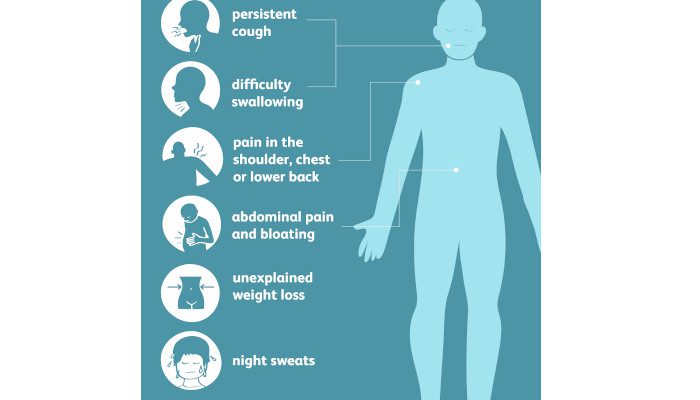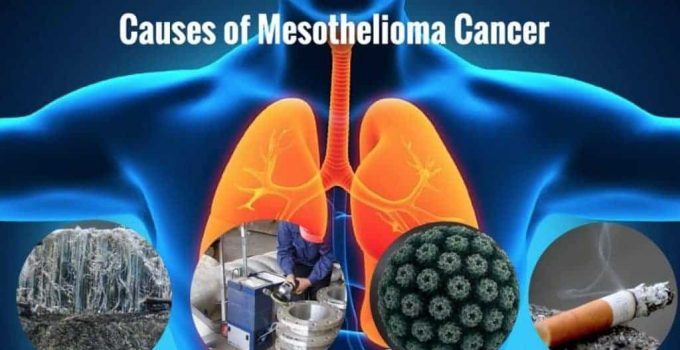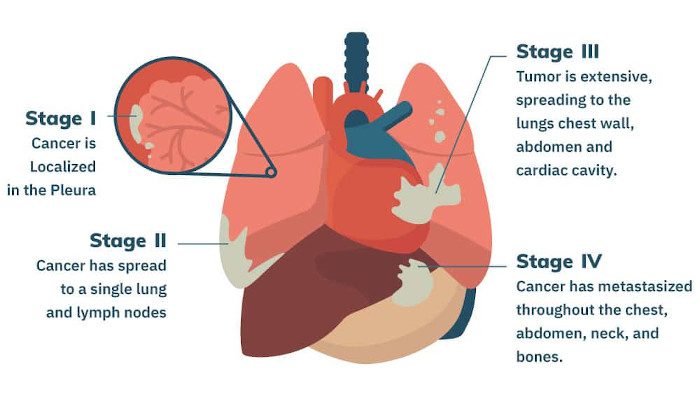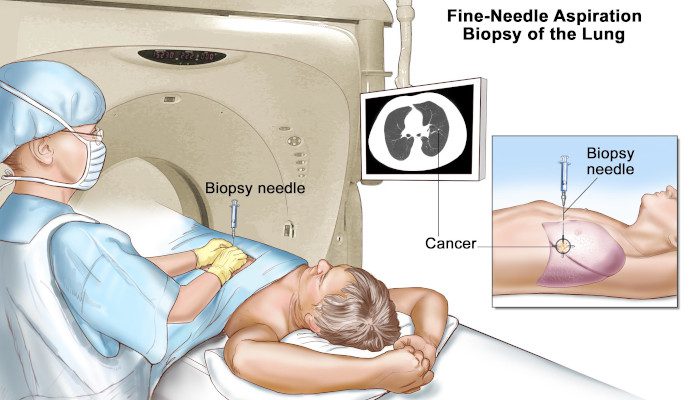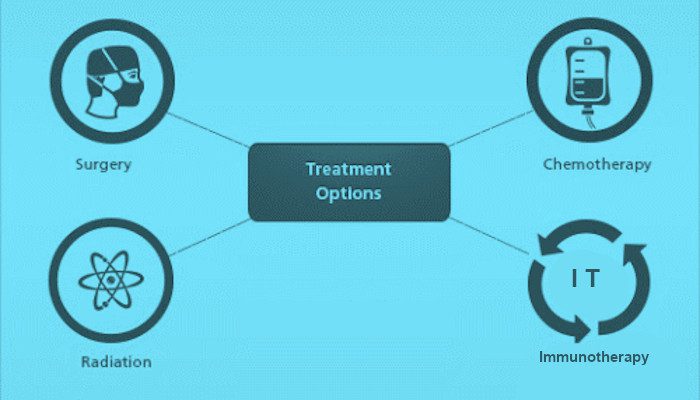Mesothelioma cancer
A cancer that occurs in the thin layer of tissue of certain parts of the body, most commonly the linings of the chest or abdomen is termed as Malignant Mesothelioma.
This type of cancer is a deadly form of cancer, however there are treatments available for Mesothelioma.
Sign & symptoms and Types of malignant mesothelioma
Mesothelioma cancer can start in four main parts of the body.
- Pleural mesotheliomas start in the chest. When cancer develops in the lining of the lungs that is pleura, that type of cancer is termed as Pleural mesotheliomas. This type of cancer is the most commonly diagnosed case of mesotheliomas.
Signs and symptoms of Pleural mesotheliomas are as follows:- Painful coughing
- Pain in the side of the chest or lower back
- Unusual lump under the skin on chest
- Shortness of breath
- Unexplained weight loss
- Fatigability
- Difficulty in breathing
- Trouble in swallowing
- Hoarseness in voice
- Swelling in face and arms
- Peritoneal mesotheliomas start in the abdomen. Peritoneal mesothelioma affects the lining of the abdominal cavity called as peritoneum and is diagnosed in about 15 – 20% of all mesothelioma cases.
Signs and symptoms of Peritoneal mesotheliomas are as follows:
- Pain in abdomen
- Swelling in the abdomen
- Fever
- Nausea and vomiting
- Unexplained weight loss
- Blood clotting abnormalities
- Bowel obstruction leading to constipation
- Anaemia
- Pericardial mesotheliomas start in the covering around the lining of the heart known as pericardium. This form of cancer is very rare.
Signs and symptoms of Pericardial mesotheliomas are as follows:
- Breathing difficulty
- Chest pain
- Irregular heart rhythm
- Fluid in chest
- Mesotheliomas of the tunica vaginalis start in the covering layer of the testicles and are very rare form of cancer, diagnosed in less than 1% of all cases. Symptoms include Testicular pain and Scrotal swelling caused by fluid buildup.
Causes and Risk factors of Mesotheliomas
- Smoking: Those who smoke are more likely to develop asbestos-related lung cancer.
- Asbestos exposure: Asbestos is a mineral which is present in our environment, its fibres are used in insulation, brakes, shingles, flooring and many other products as these are resistant to heat and strong. Exposure to asbestos is the main causing factor of pleural mesothelioma.
- Zeolites: These minerals are common in the rocks and soil in some areas. Exposure to these minerals is believed to be responsible for causing mesotheliomas in those prone areas.
- Radiation Exposure: Exposure to high doses of radiation to chest or abdomen can cause Mesotheliomas.
- Genetics: Some studies indicate that mesotheliomas can be transferred to next generation.
- Weakening of lung tissue: People with weak lung tissue are host to be exposed to asbestos.
Stages of Mesotheliomas
The stages of any cancer indicates the extent of cancer in body and expert can define the plan of treatment accordingly.
Stage 1: At this stage, the tumour is limited to the mesothelial lining and has not spread to the surrounding organ.
Stage 2: In this stage,the cancer spread to nearby organs like lung or diaphragm.
Stage 3: This stage is advanced as in this stage, cancer cells spread to nearby organs, tissues and lymph nodes.
Stage 4: This stage is advanced than previous stage, in this stage, cancer has spread to nearby as well as distant tissues, lymph nodes and organs.
Diagnosis
- Medical history and physical examination of the patient
- Blood tests: A few blood tests help rule out the problem.
- Fluid and tissue sample tests: In cases when the patient has fluid in the body that may be related to mesothelioma. A sample of is examined under a microscope for cancer cells.
- Biopsy: Cells are removed from the affected or abnormal area and examined under a microscope to confirm for the cancerous cells.
- Chest X-ray: A chest X-ray help in showing the abnormal thickening of lung lining or calcium deposits on the lung lining or presence of fluid in the chest.
- Computed tomography (CT): CT scans are used to look for the exact location of the cancer, which eventually help determine the stage of the cancer.
- Positron emission tomography (PET scan): A PET scan helps the doctor in knowing the exact location of cancer also the confirmation of diagnosis.
- Magnetic resonance imaging (MRI): MRI scans also show detailed images of the soft tissues in the body. Similarly in case of Mesotheliomas MRI scans show the exact location and extent of a tumour.
TREATMENT OPTIONS FOR MESOTHELIOMA CANCER
Treatment for mesothelioma Cancer depends on a number of factors. Treating mesothelioma often involves a combination of two or three modes of treatment. Various treatment options are discussed as below:
Cancer Surgery
Surgical options may include:
- Surgery to reduce fluid build-up. Pleural mesothelioma may cause fluid to build up in chest, causing difficulty in breathing. Surgeons insert a tube or catheter into the chest to drain the fluid.
- (Pleurectomy)Surgery to remove the tissue around the lungs. Surgeons remove the tissue lining the ribs and the lungs. This procedure would not cure mesothelioma, but may relieve signs and symptoms.
- Surgery to remove a lung and the surrounding tissue. Removing the affected lung and the tissue that surrounds may relieve signs and symptoms of pleural mesothelioma.
- Surgery for peritoneal mesothelioma. Peritoneal mesothelioma is sometimes treated with surgery to remove as much of the cancer as possible.
Book an appointment with the best oncologists for mesothelioma cancer treatment as well as diagnosis at best cancer Hospital in Delhi
Chemotherapy
Chemotherapy drugs work by attacking fast-growing cells, such as cancer cells. It stops the growth of cancerous mesothelioma cells, either by killing the cells or by stopping them from dividing.
Chemotherapy can be given by mouth, injected into a vein or muscle to enter the bloodstream and reach mesothelioma cells throughout the body, or it can be placed directly into the affected area of the body to mainly affect mesothelioma cells in that area.
Radiation therapy
Radiation therapy focuses high-energy beams to kill mesothelioma cells or keep them from growing. Radiation may be used after surgery to kill any remaining cancer cells. It may also help reduce signs and symptoms of advanced cancer in cases where surgery is not an option.
Immunotherapy in delhi
Palliative surgery
It may be considered as an option if the cancer has already spread to greater extent when it hard to remove completely. The goal of this treatment is to ease or prevent symptoms not to cure the cancer.
Book an appointment with the Best Cancer Specialist at Oncoplus Hospital.
